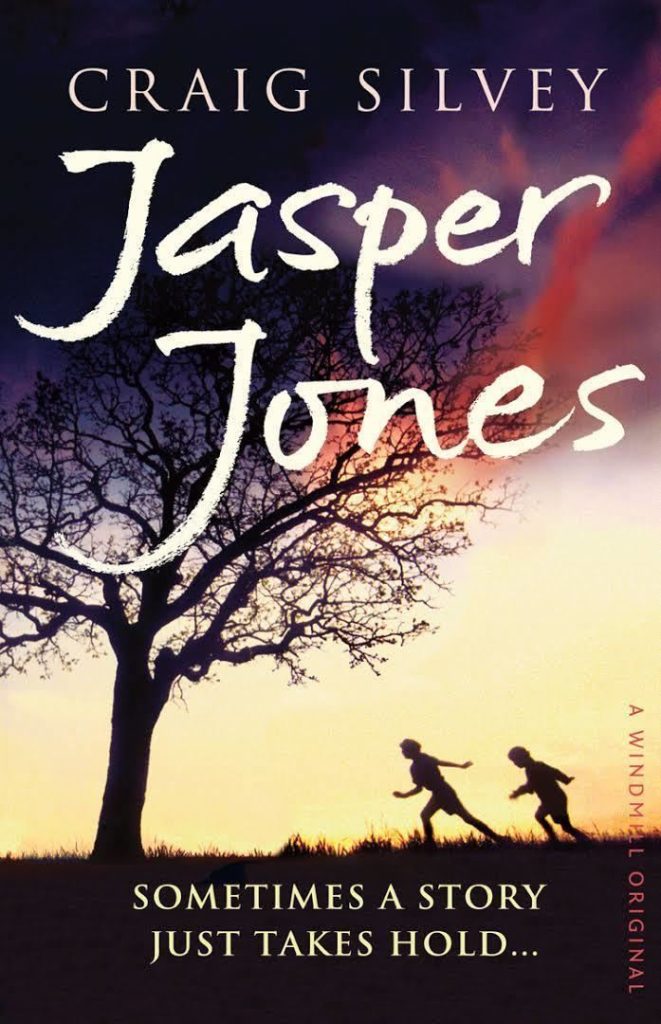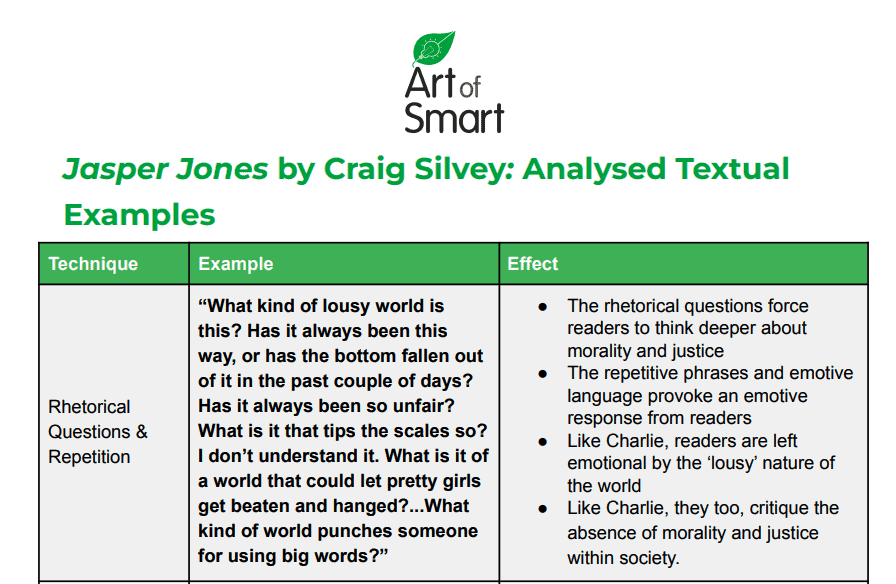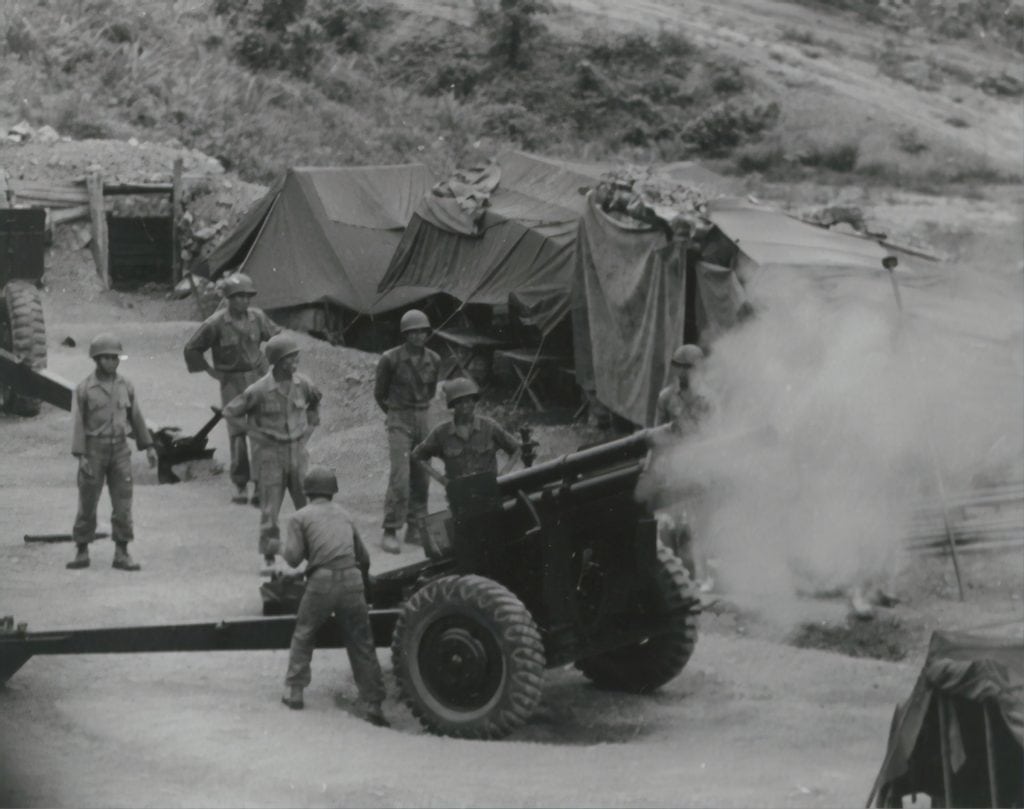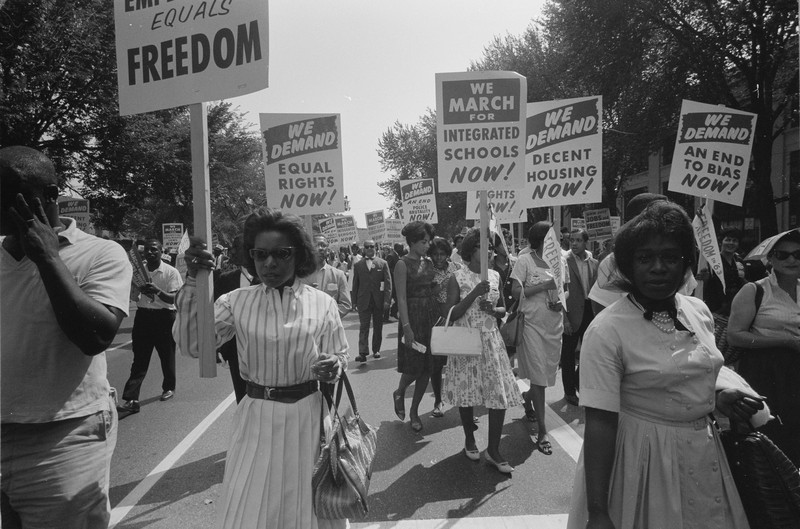Are you studying the book ‘Jasper Jones’ for English and struggling to come up with an analysis? We’ll walk you through a summary of Jasper Jones with its context, characters and more to help you with your analysis.
PLUS we’ll also provide a free sample analysis table (also called a TEE Table) and a sample paragraph that you can download!
It’s time for you to ace your book analysis of Jasper Jones — let’s get started!
Jasper Jones Plot Summary
Who are the Key Characters in Jasper Jones
Context of Jasper Jones
What are the Main Themes Explored in Jasper Jones?
Book Analysis of Jasper Jones
Studying this Text for HSC English
Plot Summary of Jasper Jones
The text begins in 1965 Corrigan, a fictional small town in Australia, and follows the experiences of 13-year-old protagonist, Charlie Bucktin.
One summer evening, Jasper Jones, who is an outcast in Corrigan because of his mixed-race background, visits Charlie and asks for his help. They go to a secluded clearing in the bush where Charlie is horrified to see the corpse of a young girl, Laura Wishart, beaten and hanging from a tree.
Jasper promises that he’s innocent but he knows that because of his outcast status and shady, rebellious image, he will most likely be blamed for her murder. Charlie and Jasper throw the body into the nearby river to buy them enough time to solve the murder themselves.
The next day, Charlie spends his morning with his parents, Ruth and Wesley Bucktin. He looks up to his father and they bond over their passion for reading and writing. However, Charlie doesn’t like his mother Ruth and finds her controlling.
He spends his days with his best friend, Jeffrey Lu, a smart and humorous boy who is Vietnamese. Since many soldiers from Corrigan were sent to fight in the Vietnam War, Jeffrey faces a lot of racism from the community, such as not being allowed to play on the town cricket team. Charlie also chats with Eliza Wishart, Laura’s younger sister, and has a crush on her.
The town find that Laura Wishart is missing
Later that day, he researches murder cases that occurred in Corrigan and nearby towns, which exposes him to some horrifying insights into murders and serial killers. He finds it really difficult to digest how and why people can hurt and kill others in such gruesome ways.
Meanwhile, a search is organised for Laura and the townspeople grow anxious as parents are fearful that more disappearances might occur. When Charlie returns home from the library, he finds that his mother is extremely worried about him and he’s punished for leaving the house without telling her.
This creates tensions between them, but his father suggests that instead of responding with anger and hatred, Charlie should be more diplomatic and polite towards his mother.
A week after Laura’s death, Jasper finally visits Charlie again and they go to their secluded glade. Jasper tells him that he’s been arrested and beaten up by the local police because they suspect he’s involved in Laura’s disappearance.
He also tells Charlie that he thinks Mad Jack Lionel, an isolated old man, is actually responsible for Laura’s murder. Before they leave the glade, they find that someone has scratched the word “Sorry” on the tree where Laura was hanged.
When Charlie returns home that night, he learns that his parents thought he was missing and had called the police. He quickly comes up with a story about sneaking out to visit Eliza and to his surprise, they’re convinced by his story. He’s later grounded for two weeks and tensions rise between his parents as Ruth blames Wesley for Charlie’s misbehaviours.
Jeffrey joins the cricket team
After spending two weeks indoors reading and writing, Charlie goes to watch Jeffrey finally bat for the Corrigan cricket team as a sub for another player. During the match, Eliza spots Charlie and sits next to him.
Charlie’s very shy and awkward around her but they talk, share some laughs, and daydream about living in New York, like the characters in their favourite books. Eliza tells him she thinks he’s very sweet and they kiss. Meanwhile, Jeffrey’s performance helps Corrigan win the cricket match and his teammates, even Warwick Trent, reluctantly congratulate and respect him.
Later that night, four men visit Jeffrey’s house and destroy his father’s garden. Charlie witnesses this and screams for his father, who immediately runs to take on all four men.
He’s joined by other neighbours, who beat up the four men and offer words of support to Jeffrey and his father. Charlie’s inspired by his father’s courage but is also very upset and wonders why someone would do such a thing.
Jasper and Charlie confront Mad Jack Lionel
On New Year’s Eve, Charlie plans to attend Corrigan’s traditional fireworks show. Eliza tells him she has something important to tell him but before he can meet up with her, Jasper shows up outside his window and asks Charlie to come with him to confront Mad Jack Lionel and get him to confess to killing Laura.
When they visit Mad Jack’s house, Charlie is surprised to see that Jack is actually a lonely old man who’s unexpectedly polite and approachable. Jasper angrily informs Jack that he knows Jack killed ‘her’.
Jack cries and confesses that he did kill ‘her’ however, he isn’t talking about Laura. As they continue to talk, it’s revealed that Jack is actually Jasper’s grandfather. When Jasper’s father married Rosie Jones, a beautiful Aboriginal woman, Jack disapproved of the marriage because she wasn’t white.
Jasper’s father then chose to change his surname to Jones and Rosie soon gave birth to Jasper. Overtime, Jack changed his mind and grew quite fond of Rosie. One day, Jack was alone with Rosie when she got appendicitis and needed medical attention. Jack tried to drive her to the nearest hospital but got into a car accident along the way, which killed Rosie.
After the accident, Jasper’s father cut all ties with Jack and also never told Jasper about him. Jack tells Jasper that he thought Jasper was avoiding him because he knew about Rosie’s death but now, he realises that Jasper had avoided him simply because he didn’t know who Jack was.
As he walks back home, Charlie bumps into Eliza, who tells him she needs to tell him something. On their way there, Charlie sees his mother with another man. Angry that she’s been having an affair, he tells her he won’t do what she says anymore.
Charlie learns the truth behind Laura’s death
Eliza takes him to Jasper’s glade, where she tells Charlie that she’s responsible for Laura’s death. She shows Charlie a letter that she found near Laura’s body and reads it to Charlie.
In the letter, Laura explains that her father had raped and abused her for years. One day, she tried to tell her mother about this, but she didn’t believe Laura. Later, she got into a fight with her father, who beat her savagely and told her to never talk about his abusiveness again.
Eliza heard some noises from Laura’s room and decided to follow Laura to Jasper’s glade where she observed the suicide. Guilt-ridden about watching her sister kill herself without saying anything, Eliza returned to the glade a few nights later and wrote ‘Sorry’ on the tree.
Traumatised by Laura’s letter and Eliza’s explanation, Charlie then confesses that he helped Jasper throw Laura’s body into the nearby river. Jasper arrives and asks what Eliza is doing there, and they tell him everything they had talked about. As the three of them stay in the glade for the rest of the night to cope with their trauma, Charlie notices that Eliza’s upset towards Jasper and blames him for the death.
Life after solving the mystery
The next day, they all go their separate ways and Charlie knows he’ll never see Jasper again because Jasper is leaving Corrigan for good. When Charlie returns home, his mother is packing to leave Corrigan too.
Charlie and his father are now on their own and Wesley finishes the novel he’s been working on. Charlie is the first to read it, and he loves it.
As the summer holidays come to an end and Charlie returns to school, he decides to sneak onto Mad Jack’s property and steal peaches to impress his classmates. While he’s there, he asks Jack to do him a favour by staging a fight with Charlie, promising to make it up to him by making Jack dinner on Sunday.
This impresses his peers even more and he walks away from Jack’s house, cheered by the school children. Charlie finds it funny that it took him more courage and bravery to pick up the peaches, which were rotten and covered with bees, than to sneak onto Jack’s property.
All of a sudden, someone sees smoke and Charlie runs towards it, seeing that Eliza’s house is on fire. Charlie sees that her parents are safe, but her father has burns on his body. He realises that Eliza was the one who set the house on fire, and realises that he’ll never completely understand her motives.
He is also confronted by the reality that Corrigan will, like always, blame Jasper for it. Charlie goes to Eliza, who calmly observes the fire, and whispers ‘perfect words’ in her ear.
Key Characters in Jasper Jones
Charlie Bucktin
13-year-old Charlie Bucktin is the protagonist of the novel. Charlie is intellectual and an aspiring writer, which often makes him an outsider in Corrigan, where athletic skills and sporting abilities are valued a lot more than academic talents.
He also loves to read and draws connections between his life and the books he reads, including notable novels such as To Kill a Mockingbird and Pudd’nhead Wilson. However, he’s still naive and innocent when it comes to the real world, and he often questions the actions of other people and the complexities of human behaviour.
Throughout the novel, Charlie struggles to grasp how crimes, injustices, and racism can occur. He’s also very anxious and irrationally fearful, but as the novel progresses, he learns to overcome his anxieties and matures significantly.
Jasper Jones
Jasper Jones is a half-Aboriginal, half-white boy who seeks Charlie’s help in hiding Laura Wishart’s body and solving her murder, which sets the rest of the narrative into motion. Jasper is raised by an alcoholic and abusive father, so Jasper often resorts to stealing for survival.
This, paired with his mixed race background, makes him an outcast and town scapegoat. He’s blamed for every crime or wrongdoing in Corrigan. As Charlie gets to know him better, he realises that Jasper is approachable, loyal and sympathetic, and that he is very different to the town’s portrayal of him.
He slowly learns that the reasons for Jasper’s status as an outcast are far more complex than he originally thought, and are rooted in social structures more than Jasper’s behaviour/personality.
Jeffrey Lu
Jeffrey Lu, a 12-year-old Vietnamese boy, is Charlie’s best friend. He is a talented cricket player and despite facing a range of obstacles, he optimistically manages to win the respect of Corrigan and plays on the cricket team, helping them win a match. Jeffrey and Charlie share an absurd sense of humour and bond over their intellect.
Eliza Wishart
Eliza Wishart is Laura Wishart’s sister and Charlie’s romantic interest. She’s intelligent, beautiful and witty, which often leaves Charlie flustered around her and he struggles to think of witty things to say to impress her.
Charlie finds her company comforting and frequently talks to her, thinks of her, or daydreams about living in New York together. Throughout the novel, Charlie suspects that Eliza knows something about Laura’s disappearance and is keeping it a secret.
Towards the end of the novel, he finally uncovers what the secret is. He also finds it difficult to understand how Eliza can appear so calm and collected while simultaneously being capable of destruction and intense emotions such as rage and sorrow.
Mad Jack Lionel
Mad Jack Lionel is a recluse resident of Corrigan, who is feared by young people in the town because of different urban myths and rumours about him. As a result, children try to steal peaches from a tree on his property as a sign of courage.
One of the rumours about Mad Jack Lionel, is that he once killed a woman many years ago. As Jasper and Charlie investigate Laura’s death, they learn that Jack is Jasper’s grandfather and that he got into a car accident while driving Jasper’s mother to a hospital, which caused her death.
Towards the end of the novel, Charlie starts to see Mad Jack Lionel as a lonely, misunderstood old man and believes he deserves compassion and sympathy.
Ruth Bucktin
Ruth Bucktin, Charlie’s mother, is an antagonistic figure in Charlie’s life and he sees her as cold, angry and unreasonably strict.
She’s unhappy with her life in Corrigan and would prefer to be living with her wealthy parents, far from Charlie and Wesley. Charlie’s relationship with his mother is completely undone once he discovers that Ruth is unfaithful to his father.
Wesley Bucktin
Wesley Bucktin is Charlie’s father and Ruth’s husband. Wesley is very intelligent, calm and patient, who always tackles problems diplomatically.
He’s one of Charlie’s biggest role models and Charlie appreciates his father’s honesty and straightforwardness. However, Charlie realises that even Wesley has his secrets, including that he is secretly working on a novel.
Context
Jasper Jones is set in 1965 Corrigan, a fictional small Australian town. As the 1960s were a period of major social change both within and beyond Australia, the decade was seen as a turning-point in Australian history. It was considered to be super influential on the country’s growth and development.
During the 1960s, the USA and the Soviet Union were involved in a long and violent war in Vietnam. As an ally of the United States, Australia sent thousands of its own troops to fight alongside America.
Many of the troops faced horrific deaths, which led to a lot of criticisms within Australia about the country’s decision to fight in the Vietnam War. As a result, many Asian residents in Australia, found themselves to be victims of violence, racism and harassment.
The 1960s also saw the rise of civil rights movements across America and Australia, which advocated against racial discrimination. In Australia, civil rights activists fought for equal rights for Indigenous Australians and criticised racism in colonised Australia.
The second wave of feminism also emerged during the 1960s (a lot of changes were happening in this decade!) and criticised sexual harassment, double standards, and discrimination within a patriarchal society.
This is the context protagonist Charlie Bucktin finds himself in, as he navigates growing up and coming of age in a period of major changes worldwide.
Themes Explored in Jasper Jones
Here are some of the themes in ‘Jasper Jones’ to help your analysis:
- Justice and Morality
- Racism
- Truth and Honesty
- Coming of age
- Power
- Sympathy, Empathy and Understanding
Looking for a list of quotes from the text? We’ve got you covered with our Jasper Jones quotes!
How to Analyse the book, Jasper Jones, in 3 Steps
When you’re answering an English essay question, you might be tempted to start with your thesis. But it’s actually better to lay the foundations of your essay with a strong analysis! While a good thesis is super important, you can’t get those top marks without analysing your text first.
Once you’ve got an in-depth analysis of the text and its meaning, you can develop a solid essay response.
Are you trying to write an essay for Jasper Jones that’s going to get you great marks? If yes, you might benefit from some personalised help with one of our English tutors in the Hills District and all across Sydney!
We’ll be walking you through an analysis of Jasper Jones with these simple steps!
Step 1: Choose your example(s)
Your example is the evidence to support your argument, so finding good examples is super important when it comes to analysing a text!
For this analysis, we’re looking at how Jasper Jones explores justice and morality within society. We’ve chosen the following quotes as an example:
“What kind of lousy world is this? Has it always been this way, or has the bottom fallen out of it in the past couple of days? Has it always been so unfair? What is it that tips the scales so? I don’t understand it…”
“I understood then that maybe we really did do the wrong thing for the right reasons”
Step 2: Identify your techniques
Now that we’ve found a good example, we need to identify the techniques used within that example. Techniques help you to delve deeper into the meaning of the text and really strengthen your argument!
Try to find at least two techniques within your example to create a sophisticated and strong analysis!
In this example, we’ve identified 3 techniques: repetition, rhetorical questions, and contrast.
Step 3: Carry out your analysis
Once you’ve got your examples and techniques, it’s time to put it all together!
When you’re carrying out your analysis, remember that the focus should be on the effect of the techniques. As you analyse your examples and techniques, flesh out their effects and how they support your argument.
Think about what the composer is trying to express and how the techniques they use achieves this deeper meaning.
To achieve those top marks, you need to go beyond simply stating your techniques and examples.
Rather than simply labelling techniques like this:
Craig Silvey uses rhetorical questions and repetition as protagonist Charlie asks himself, “What kind of lousy world is this? Has it always been this way, or has the bottom fallen out of it in the past couple of days? Has it always been so unfair? What is it that tips the scales so? I don’t understand it…”. He contrasts this with Charlie’s realisation “that maybe we really did do the wrong thing for the right reasons”. Through this use of repetition, rhetorical questions and contrast, Silvey interrogates the complexity of justice and morality within society.
Our analysis needs to take a deep-dive into how those techniques create meaning. This would look more like:
Protagonist Charlie Bucktin finds himself asking a series of rhetorical questions, like “What kind of lousy world is this? Has it always been this way, or has the bottom fallen out of it in the past couple of days? Has it always been so unfair? What is it that tips the scales so? I don’t understand it…”. Silvey’s use of repetition and rhetorical questions provokes an emotive response from readers as they empathise with Charlie’s critique of the absence of morality and justice within society. This is contrasted by Charlie’s interrogation of his own actions to help hide Laura Wishart’s body further in the novel, as he reflects, “I understood then that maybe we really did do the wrong thing for the right reasons”. As Charlie undergoes the coming-of-age journey through a process of emotional growth, he develops a deeper understanding of the complexities of morality. He acknowledges the multi-faceted nature of morality and recognises the tension between achieving justice and meeting moral obligations.
Studying this text for HSC Year 11 Module B: Close Study of Literature
If you’re studying this text for HSC Year 11 Standard English Module B: Close Study of Literature, we’ve got you covered! We’ll show you how you can link your analysis to the syllabus focus questions.
Link #1: How do the distinctive qualities of texts shape the way we respond to them?
One distinctive quality of Jasper Jones is that it’s written from a first-person narrative voice and follows the perspective of 13-year-old Charlie Bucktin.
With this perspective, we gain insights into the characterisation of a coming-of-age protagonist, which shapes how we respond to the text by encouraging us to empathise with Charlie and engage personally with the text by drawing parallels to our own experiences as an adolescent.
This shapes the way we respond to Jasper Jones emotively as Charlie progresses from childhood innocence towards maturity.
Link #2: How do texts represent ideas and concerns from the context in which they are composed?
Craig Silvey grew up in a rural town in Western Australia, which is represented by the text’s setting of Corrigan, a fictional town in Western Australia that parallels his own personal experiences, ideas and concerns.
Delving deeper into the context in which Jasper Jones was composed, Craig Silvey talks about what he wanted to explore through Jasper Jones and discusses how he wanted to foreground the coming-of-age experience, especially “that moment where the bubble is burst and you’re suddenly exposed to the real truth of things”.
The author’s background in relation to the composition of Jasper Jones shows how context can shape the creative decisions made when writing a text, and how these are represented through the text.
Get some essay practice in with our practice questions for Year 11 English Standard Module B!
Need some help analysing other texts?
Check out other texts we’ve created guides for below:
- All the Light We Cannot See
- Lord of the Flies
- Hamlet
- Jojo Rabbit
- Jane Eyre
- In Cold Blood
- To Kill a Mockingbird
- Amélie
- Pride and Prejudice
- The Book Thief
- Nick and the Candlestick
- Things Fall Apart
- Mrs Dalloway
Are you looking for some extra help with your book analysis of Jasper Jones?
We have an incredible team of English tutors and mentors!
We can help you master your book analysis of Jasper Jones by taking you through the summary, key characters and themes. We’ll also help you ace your upcoming English assessments with personalised lessons conducted one-on-one in your home or online! Check out Parramatta tutoring for personalised tutors at your home!
We’ve supported over 8,000 students over the last 11 years, and on average our students score mark improvements of over 20%!
To find out more and get started with an inspirational English tutor and mentor, get in touch today or give us a ring on 1300 267 888!
Maitreyi Kulkarni is a Content Writer at Art of Smart Education and is currently studying a Bachelor of Media and Communications (Public Relations and Social Media) at Macquarie University. She loves writing just about anything from articles to poetry, and has also had one of her articles published with the ABC. When she’s not writing up a storm, she can be found reading, bingeing sitcoms, or playing the guitar.









